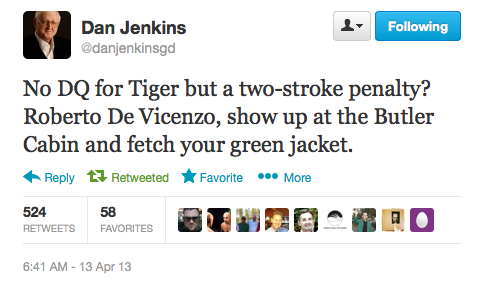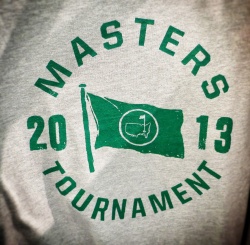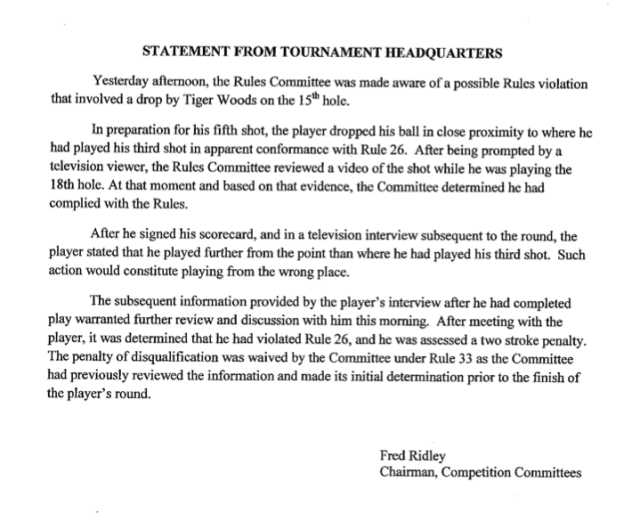When you come to think of it that is the secret of most of the great holes all over the world. They all have some kind of a twist. C.B. MACDONALD
2013 Masters: Your Kneejerk Reaction
/2013 Masters Final Round Open Comment Thread
/The readers here overwhelmingly like Brandt Snedeker's chances.  CBS airs Jim Nantz Remembers (wth Ben Crenshaw) at 1, followed by network coverage at 2 ET.
CBS airs Jim Nantz Remembers (wth Ben Crenshaw) at 1, followed by network coverage at 2 ET.
Here's the press release on the Nantz show.
The final round hole locations. Click on the image to enlarge:
Lindsey's Ex Jokes About Masters Call-In: "You always have to keep an eye on those cheaters ;)"
/Lagardère Eyes Excel, Mega-Sports Agency In Works?
/"ESPN Has Highest-Ever Friday Masters Ratings, Audience"
/Clippings: Woods Penalty Analysis
/I've written a short Golf World Daily item on this, but right off the bat, I and many others got this part of the Tiger Woods 2-stroke penalty wrong: it was the long held Rule 33-7 which the Masters Committee invoked to absolve Woods of disqualification. NOT, 33-7/4.5, which specifically addressed the HD video call in issue. Even Tiger, talking after the round, did not understand this:
TIGER WOODS: I don't know. Under the rules of golf I can play. I was able to go out there and compete and play. Evidently this is the Harrington rule, I guess. If it was done a year or two ago, whatever, I wouldn't have the opportunity to play. But the rules have changed, and under the rules of golf I was able to play.
The initial Golf Channel and ESPN standups suggested 33-7/4.5, and only after Fred Ridley's press conference and some help from rule aficionados did more understand the distinction. Nick Faldo, critical of Woods on his Golf Channel appearance, backed down on CBS according to Michael Hiestand.
Talking about Woods' two-stroke penalty as a result of a rules violation Friday, Faldo noted golf rules were relatively cut-and-dried in the past -- with players generally disqualified for infractions. Now, he suggested, interpretations are more nuanced. Said Faldo on-air: "We're in a new era, under new rules."
 However, as this Brendan Porath posted video notes, Faldo's contrition in the CBS Butler Cabin opening continued to suggest Woods was a beneficiary of a new rule, when it was an old decision that the committee invoked.
However, as this Brendan Porath posted video notes, Faldo's contrition in the CBS Butler Cabin opening continued to suggest Woods was a beneficiary of a new rule, when it was an old decision that the committee invoked.
Doug Ferguson's story provides a definitive account of the episode and he notes this right off the bat:
In a bizarre twist to a complex case, it was a television viewer’s phone call that ultimately spared the world’s No. 1 player.
Randall Mell denounced the club's actions over the last two days.
A foul odor hung over Augusta National on Friday when Tianlang Guan was penalized one shot for slow play. The club had discretion in the matter, and it decided not to cut the kid a break. Because while Guan clearly was in violation of the tournament’s slow-play policy, it’s difficult to believe he is the first player in 77 years of the Masters to be in violation. The air here freshened a bit when Guan made the cut, becoming the youngest player to make a cut in major championship history.
Now, with Augusta National using its discretion in the Woods ruling by waiving a DQ for signing an incorrect scorecard, this Masters doesn’t smell right again.
 Gene Wojciechowski was also not very kind to Ridley's Rules Committee.
Gene Wojciechowski was also not very kind to Ridley's Rules Committee.
Woods broke a ball-drop rule -- or more correctly, he played from the wrong place after a ball-drop violation. Simple as that. Then the rules committee botched a review of the drop. Simple as that. Then Woods said what he said about the 2 yards.
And then nothing became simple.
My initial gut reaction: He should have been disqualified. If he wasn't DQ'd, he should have withdrawn from the tournament. After all, whether he realized it or not, Woods had broken a rule and had eventually signed an incorrect scorecard.
It would have been the noble thing for Woods to withdraw. I still believe that. But it wouldn't have been the practical -- or correct -- thing to do.
Jeff Rude caught up with good, great or legendary agent Mark Steinberg who says Tiger rose at 7:30 and was at the club by 8 am to explain his non-willful violation.
Cameron Morfit says Tiger can't win this Masters even if he wins this Masters.
Dave Kindred makes several key points in this column, especially this one:
Only in golf are the competitors also the referees. They police themselves and they police others. Many a player would have stopped Woods from the incorrect drop. (By the way, he said that happened because he was "a little ticked" at the misfortune of the first shot kicking back into the water. He also said he "wasn't even really thinking," which is news, considering he'd earlier said he had thought enough to plan the drop two yards back.
In the website poll here, 47% said he should WD, 50% said he should not WD and 3% were unsure.
 In a must read, Dave Shedloski caught up with Dow Finsterwald, member of the Masters Rules Committee and recipient of an eerily similar bit of committee effort to avoid a disqualification.
In a must read, Dave Shedloski caught up with Dow Finsterwald, member of the Masters Rules Committee and recipient of an eerily similar bit of committee effort to avoid a disqualification.
John Morrissett, formerly of the USGA and one of the top rules authorities on the planet, praised the committee's handling and noted this in a Facebook post:
Consider the ramifications if the Committee had disqualified Tiger today. In that case, Tiger would be justified in being furious at the Committee for failing to advise him of the issue yesterday before he returned his score card so that he could have avoided disqualification. Tiger made an error and is penalized two strokes; the Committee's incorrect ruling should not result in further penalty.
Cassie Stein compiles the Tweets of players and dignitaries and they aren't very kind to the committee.
And fnally, the last word goes to the Ancient Twitterer.

**AP's Jim Litke says CBS announcer "Jim Nantz sees the interview Friday night and calls Masters officials. They call Woods on Saturday morning and review video of the shot with him."
Scott Michaux in the Augusta Chronicle with this tough assessment of the day:
In a colossal accumulation of failures by all parties to properly apply the rules of golf regarding Woods’ drop on the 15th hole Friday, the Masters rules committee came up with a hybrid solution that retroactively assessed Woods a two-shot penalty yet kept him in the tournament despite signing an incorrect scorecard.
It is far from a Solomonic compromise and has sparked outrage and debate around the world a day after the tournament docked a 14-year-old amateur a stroke for playing too slowly. Shrieks of favoritism will abound and never go away if Woods rallies from four strokes behind and wins his 15th major.
Instant Poll: Who Will Win The 2013 Masters?
/2013 Masters Third Round Open Comment Thread
/CBS coverage kicks off at 3 PM ET.  It should be a Saturday unlike any other!
It should be a Saturday unlike any other!
Instant Poll: Should Tiger Woods Withdraw?
/Some are calling on Tiger Woods to "man up" and withdraw from the Masters for violating the rules of golf.
He tees off at 1:45 ET.
Statement From Masters Tournament Committee On Tiger Penalty
/So they are not invoking the HD Decision, but instead taking some of the blame. So many questions here, but we'll just go with the statement for now:

**Tiger's statement on Twitter:

**ESPN's breakdown of the drop, includes analysis from Azinger, North and Strange.
Faldo, Chamblee Calling On Woods To "Man Up" & WD
/Stunning contrast right now on Golf Channel and ESPN this wacky morning.
Nick Faldo and Brandel Chamblee right now are calling on Tiger Woods to "man up" (Faldo) and that he knows he gained an advantage, knows he broke the rule and has not yet withdrawn "sad" (Chamblee).
Both players made clear they believe he made a mistake, mixed up the rules and did not intentionally cheat.
ESPN meanwhile, with Andy North and Curtis Strange, have been lauding the committee's use of the Decision and that this is why the rule was created. Whether it was created for this reason though, is very much in dispute.
Decision 33-7/4.5 Flashback: "The R&A and the USGA confirm that the disqualification penalty still applies for score card breaches that arise from ignorance of the Rules of Golf."
/You can read the USGA/R&A April 2011 release on the Decision change related to select high definition video driven disqualifiations. But it makes abundantly clear that ignorance of the rules is not included in the Decision invoked by the Masters Committee in issuing Tiger a 2-shot penalty Saturday morning.
This revision to Decision 33-7/4.5 addresses the situation where a player is not aware he has breached a Rule because of facts that he did not know and could not reasonably have discovered prior to returning his score card. Under this revised decision and at the discretion of the Committee, the player still receives the penalty associated with the breach of the underlying Rule, but is not disqualified.
In revising the decision, The R&A and the USGA confirm that the disqualification penalty still applies for score card breaches that arise from ignorance of the Rules of Golf.
The actual wording from the Decision:
A Committee would not be justified under Rule 33-7 in waiving or modifying the disqualification penalty prescribed in Rule 6-6d if the player’s failure to include the penalty stroke(s) was a result of either ignorance of the Rules or of facts that the player could have reasonably discovered prior to signing and returning his score card.













